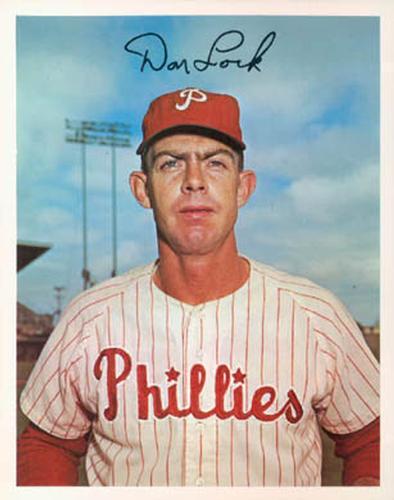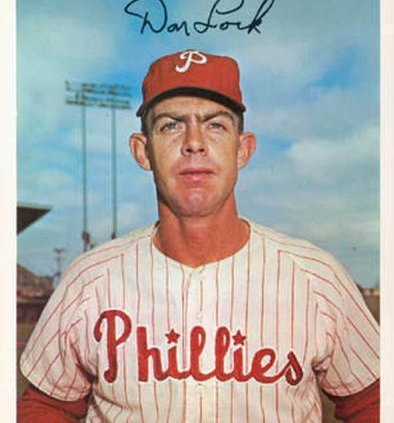May 21, 1967: Don Lock’s walk-off single ends 18-inning marathon
 Cincinnati arrived in Philadelphia on a five-game winning streak. After losing the first game of their four-game series with the Phillies, the Reds had won the next two and were hoping to continue their winning streak in the final game of the series.
Cincinnati arrived in Philadelphia on a five-game winning streak. After losing the first game of their four-game series with the Phillies, the Reds had won the next two and were hoping to continue their winning streak in the final game of the series.
The Phillies were already 9½ games behind the Reds and were struggling to stay relevant early in the 1967 season. They had won just two of their previous 10 games. For this game, only 8,641 fans hoped to see their team finally begin to come out of its slump.
Chris Short started for the Phillies. He was one of the anchors of the Philadelphia starting rotation, having led the team in victories the previous year with a 20-10 record. Short pitched well in his two starts before this game, striking out 12 batters and giving up just seven hits in 13⅓ innings. (He did not get a win for his efforts in either game.)
The Phillies wasted no time in giving Short a one run-lead in the bottom of the first. Tony Gonzalez and Dick Allen led off with singles off Reds starter Milt Pappas. Gonzalez moved to third on a fly to right by Johnny Callison and came home on another fly, this one to deep left field, by John Briggs.
Short blanked the Reds through the first eight innings. After getting the side out in order in the first, he gave up two singles in the second but got out of the jam when the next two batters grounded out. When Lee May singled in the fourth, he was caught stealing to end another Reds scoring opportunity.
The same thing happened in the fifth after Chico Ruiz singled. Phillies catcher Clay Dalrymple threw out Ruiz as he tried to steal second. Tommy Harper hit a one-out double in the sixth, but the Reds could not advance him home when Short got the next two outs on a fly ball to center field and a grounder to second. When Tony Perez singled in the seventh, a double play ended the Reds’ chance to score.
Phillies manager Gene Mauch “turned the lineup upside down and inside out” to try get some offense. Dick Allen, who hadn’t hit a homer in nearly a month, was batting second. “I’m trying find some way to get [other teams] to change their thinking on how to pitch to Allen,” Mauch said before the game.1
For the first eight innings, it seemed as if that one run would be all Short would need. But he walked leadoff batter Harper in the top of the ninth. Harper stole second and came home with the tying run when Perez banged a groundball cleanly through a hole to left field.
The Phillies faithful hoped their team might score the winning run in the bottom of the ninth. But Ted Abernathy, who had come into the game for Pappas in the eighth, got the Phillies out in order to send the game into extra innings.
Short showed no sign of slowing down. Over the next three innings, he allowed just one baserunner, walking Dick Simpson with one out in the 10th. Short struck out eight batters, walked just two and had lowered his ERA from 2.88 to 2.52 when he was pulled for a pinch-hitter in the bottom of the 12th.
Mel Queen had come in from the bullpen in the 10th for the Reds. He got the side out in order in the 10th and worked out of a jam in the 11th inning after giving up consecutive singles that put a runner on third with two outs.
When Queen returned to the mound in the 12th inning, he surrendered a double to Cookie Rojas, who advanced to third on a relay error by shortstop Leo Cardenas. Queen intentionally walked Gary Sutherland. Reds manager Dave Bristol went to his bullpen and brought in southpaw Billy McCool. Mauch reacted by sending right-handed-batting Jackie Brandt to the plate.
Brandt hit a high chop to third with the infield playing in. He was thrown out at first while Rojas held at third and Sutherland took second. With pinch-hitter Tony Taylor at bat, the Phillies attempted a squeeze play. The Reds guessed what was happening and McCool threw a pitchout. Rojas was caught in a rundown along the third-base line. McCool then got Taylor to fly out, ending another Phillies opportunity to grab a win.
“You know Gene [Mauch] squeezes a lot,” Bristol said later. He had signaled his infielders to be ready for the bunt possibility. “They fooled me,” Mauch acknowledged. “I never thought that they’d pitch out with Allen coming up next. They showed me something there.”2
Dick Hall took over the pitching duties for the Phillies in the top of the 13th and pitched five scoreless innings. The Reds put runners in scoring position in the 14th inning when Pete Rose hit a two-out single and went to third when Perez followed with a single to right field. The hit extended Rose’s hitting streak to 17 games. Mauch later kidded with reporters about “stopping Rose from getting a hit in the first game of the doubleheader.”3 When Rose hit another single in the 17th, he was the last Red to reach base.
Hall pitched the final six innings. When Mauch asked him if he was all right to continue pitching, Hall told him, “I’m all right. I just had nine days rest.”4
Meanwhile McCool kept the Phillies in check through the 14th inning. In the 15th he was replaced by Don Nottebart. Nottebart got the Phils out in order in the 15th but had to work himself out of a jam the next inning. In that inning Allen led off with a triple off the scoreboard in right field. Two intentional walks loaded the bases with one out. Dalrymple then hit a groundball to Rose, who had moved to second in the eighth. Rose threw out Allen at the plate, and catcher Johnny Edwards threw to first to get Dalrymple for the double play retiring the side.
The Reds went to their bullpen again in the 17th. Darrell Osteen got the side out in order. When he returned to the mound the next inning, Osteen fanned leadoff batter Dick Hall, then walked Allen, who reached second when Callison grounded out weakly to the right side of the infield. Don Lock, who had entered the game as a substitute for Briggs five innings earlier, hit a single to center field. The speedy Allen did not stop at third and reached home before the throw from Vada Pinson.
The Phillies’ 2-1 victory split the series. Bill Ford of the Cincinnati Enquirer described the contest as a “titanic struggle that embellished splendid pitching, shrewd strategy and futile frustration.”5
It took the Phillies 4 hours and 38 minutes to get home the winning run. It tied for the longest game by innings in the majors at that point in the season. (The Red Sox had beat the Yankees, 7-6, on April 16 in a game took 5 hours and 50 minutes to complete, more than an hour longer than it took the Phillies to claim victory.)
Mauch was in a jovial mood after the game, telling reporters,“Every game makes somebody happy.” He was asked if he had ever seen a team blow as many chances as his Phillies had in this game. “It happened for us once,” he said. “The Giants had the winning run on third twice with none out and one on second – in the 10 th, 11th, and 12th. That’s the night when Alvin Dark picked up the stool in the clubhouse and tore his finger off when he threw it.”6 Mauch was not throwing any furniture this evening.
The win did not get the Phillies out of their slump. They lost five of their next six games. But they eventually got on track and finished the season in fifth place in the 10-team NL with an 82-80 record. The Reds continued to lead the league but they lost their early-season momentum. After the 18-inning loss in Philadelphia, they lost six of their next 10 games in May. St. Louis eventually overtook the Reds for first place by the end of June and remained there on their way to a World Series championship while the Reds finished in fourth place.
SOURCES
In addition to the sources cited in the Notes, the author used Baseball-Reference.com and Retrosheet.org for box-score, player, team, and season information as well as pitching and batting game logs, and other pertinent material.
baseball-reference.com/boxes/PHI/PHI196705210.shtml
retrosheet.org/boxesetc/1967/B05210PHI1967.htm
NOTES
1 Frank Dolson, “Every Game Has a Happy Side, Mauch Says,” Philadelphia Inquirer, May 22, 1967: 25.
2 Dolson.
3 Dolson.
4 Dolson.
5 Bill Ford, “Reds Struggle 18 Innings, Then Phils Take 2-1 Decision,” Cincinnati Enquirer, May 22, 1967: 48.
6 Dolson: 26.
Additional Stats
Philadelphia Phillies 2
Cincinnati Reds 1
18 innings
Connie Mack Stadium
Philadelphia, PA
Box Score + PBP:
Corrections? Additions?
If you can help us improve this game story, contact us.


